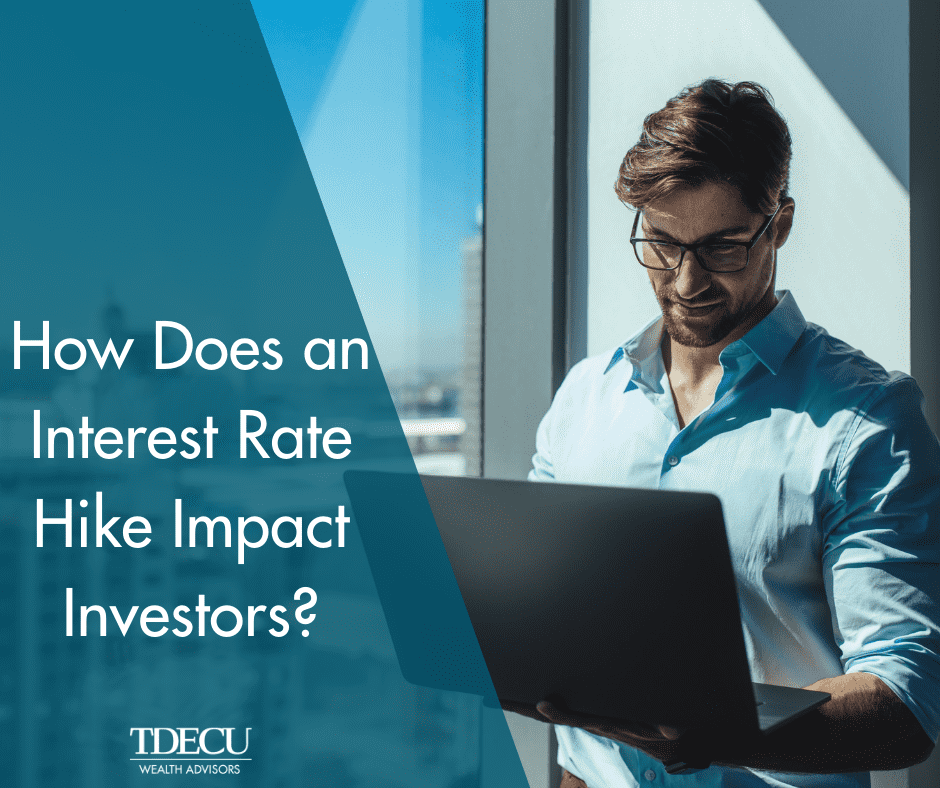The Federal Reserve plans to unwind its bond borrowing since inflation has hit the highest level since 1980. While interest rates will stay near zero, for now, the Fed will start raising interest rates as early as March 2022. With a strong labor market and December 2021's inflation rate near 7%, the target range for the Federal Funds Rate will begin to increase as a way to help contain soaring inflation.
Interest rates can positively or negatively affect the U.S. economy, the stock markets, and your investments. When the Fed changes the Federal Funds Rate, the rate at which banks can borrow money to lend to businesses or individuals creates a ripple effect. Consumers will have to pay more to borrow and benefit less from lower rates on their deposits as household budgets squeeze even tighter.
The raising and lowering of the Fed Funds Rate is the role the Fed plays in stimulating or slowing down the economy. In theory, lowering interest rates should help boost the U.S. economy by encouraging borrowing and spending; consumers and businesses are more willing to make big purchases. Higher interest rates slow down borrowing and spending and restrict money flow into the economy. Both of these scenarios reflect the performance of the stock market and your investments.
Small interest rate hikes spread over a few months likely won't be as impactful to individuals with low debt-to-income ratios. But for those with a lot of debt, increasing interest rates are unwelcome. Here are some of the debt instruments that are interest-rate sensitive:
- Student Loans
- Home Mortgages with Variable Rates
- Credit Card Interest Rates
- Savings Accounts and CDs
- Auto Loans
While some of these debts may have a set interest rate, often, the rate is a revolving rate depending on the prime rate. For this reason, investors must contact their financial institutions to lock in the interest rates before rates increase.
Many financial institutions will not pass along higher interest rates to savers. Therefore, if you have fixed-income investments, the teeter-tottering of interest rates can negatively impact your portfolio depending on the type of investments you hold:
- bonds- prices fall, but income is generally higher
- money market funds
- bond mutual funds
- Bond ETFs.
If you have concerns about rising interest rates, now is a great time to meet with our team to help ensure your interest-rate-sensitive investments are positioned based on your financial situation.
Have specific questions? Don't hesitate to reach out to me today
Wes Garner, CRPC
Principal Wealth Strategist
(281) 269-8669
wgarner@tdecu.org

Sources:
https://tradingeconomics.com/united-states/inflation-cpi
https://www.investopedia.com/articles/stocks/09/how-interest-rates-affect-markets.asp
Important Disclosures
Interest Rate Risk is the risk that an investment’s value will change due to a change in the absolute level of interest rates, in the spread between two rates, in the shape of the yield curve or in any other interest rate relationship. Such changes usually affect securities inversely and can be reduced by diversifying (investing in fixed-income securities with different durations) or hedging (e.g. through an interest rate swap).
Investing involves risk including loss of principal.
The Fed funds rate is the interest rate on loans by the Fed to banks to meet reserve requirements.
Inflation is the rate at which the general level of prices for goods and services is rising, and, subsequently, purchasing power is falling.
All information is believed to be from reliable sources; however LPL Financial makes no representation as to its completeness or accuracy.
This article was prepared by Fresh Finance.
LPL Tracking #1-05239387
